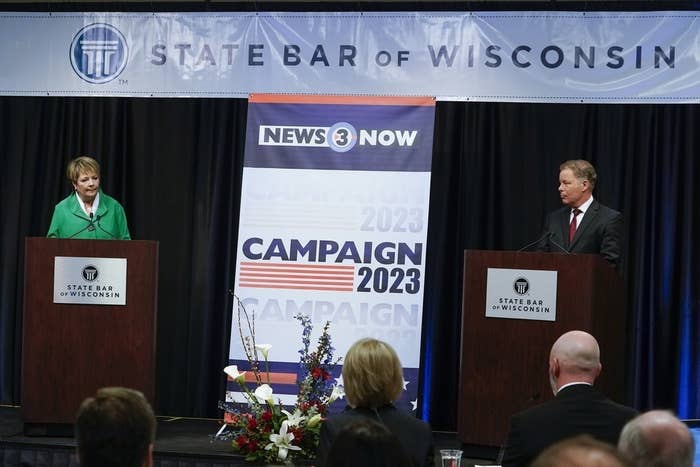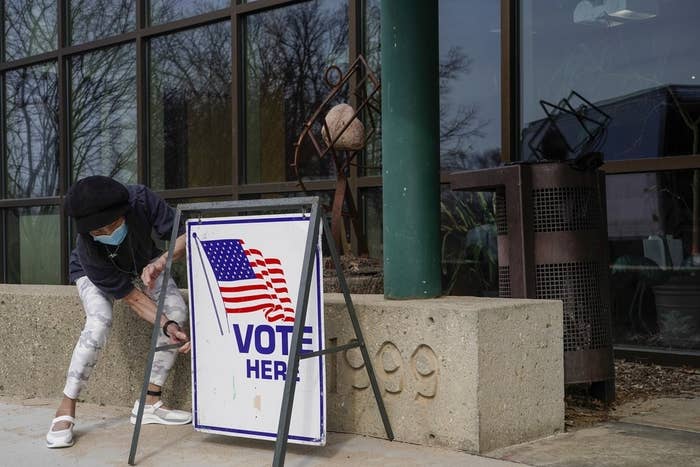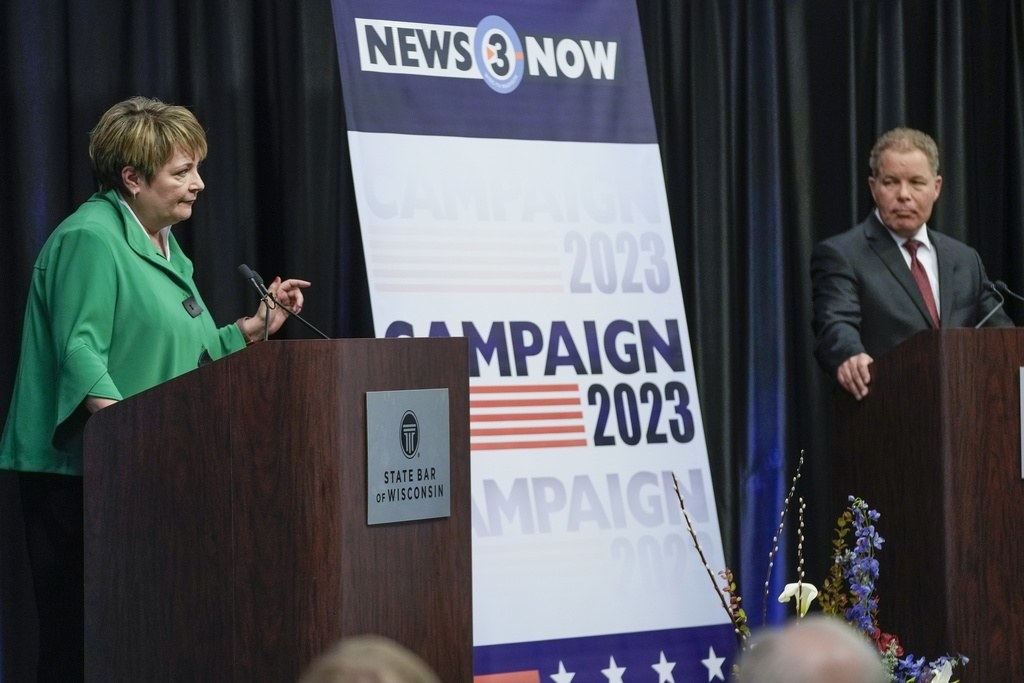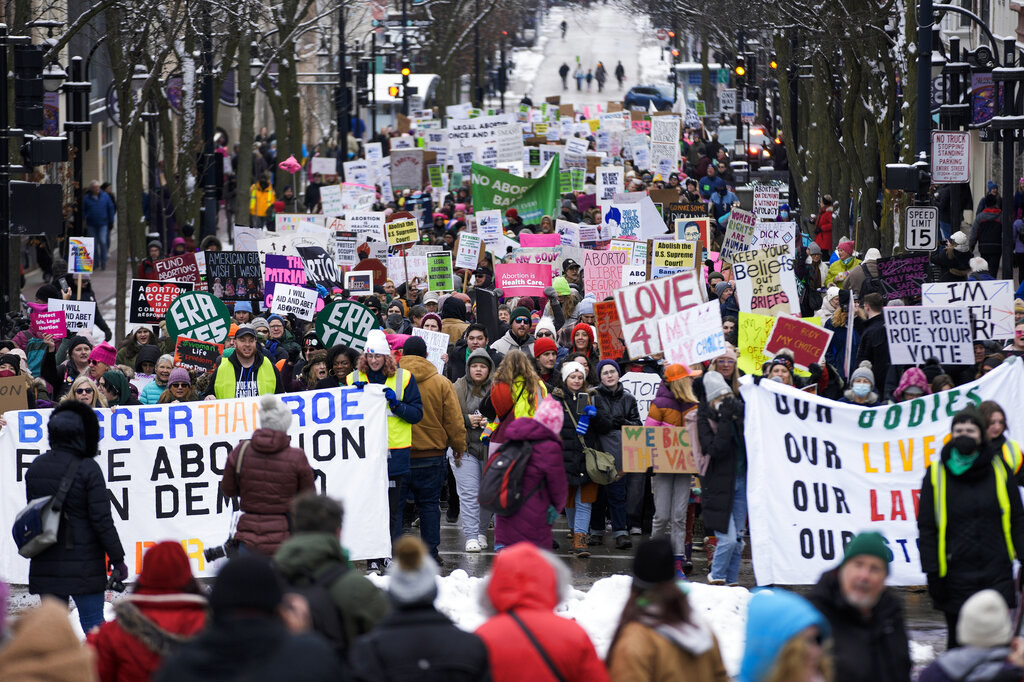
Voters in Wisconsin will have their say on Tuesday in what’s being dubbed the most important election of the year for abortion rights.
On Tuesday, voters will cast ballots for a seat on the Wisconsin Supreme Court. Though the state Supreme Court is technically nonpartisan, the outcome of this race will determine the ideological balance of its judges, directly affecting the future of abortion rights in the state as the court is expected to weigh in on whether an 1849 law banning abortion should remain on the books.
“When the US Supreme Court overruled Roe v. Wade, there was a lot of talk about the issue of abortion being sent to the state legislatures. In fact, that's wrong: Ultimately, the question goes to the 50 state supreme courts, each of which has to interpret its state's constitution,” Howard Schweber, a political science professor at the University of Wisconsin-Madison, told BuzzFeed News.
After the US Supreme Court struck down Roe v. Wade last June, the issue of reproductive rights has taken center stage in state elections. Last summer, voters in Kansas rejected an attempt to strip abortion protections from their state constitution, and during last fall’s midterm elections, voters in several states, including Michigan and Kentucky, defended reproductive rights on the ballot.
In Wisconsin, when Roe was overturned, the 1849 ban, which prohibits all abortion in all cases except to save the pregnant person’s life, once again took effect. The state’s Democratic attorney general, Josh Kaul, with the support of Democratic Gov. Tony Evers, sued to overturn the ban and pledged not to enforce it while the legal challenge continues to make its way through the courts. Still, many abortion providers in the state stopped performing the procedure because of ambiguity around its legality.
Kaul and Evers won reelection in November after campaigning on their support for abortion rights. The case is now expected to go before the state Supreme Court in the next year or two, and the justices will have the final word on whether the 1849 ban remains the law.
The election has become one of the most closely watched contests in the country, with former president Barack Obama encouraging Wisconsinites to get out and vote. It has also broken spending records as the most expensive state Supreme Court election in US history, with nearly $29 million going to political ads, according to the Brennan Center for Justice.

Though conservatives have held a 4–3 majority on the state Supreme Court since 2008, Wisconsin is traditionally a swing state, and the last six presidential elections have been decided by less than a percentage point. The outcome of Tuesday’s vote will no doubt contribute to shaping the 2024 election landscape.
Not only will the Wisconsin Supreme Court hear the case on the abortion ban, but the court will also determine whether the state’s legislative districts will be redrawn, among other things.
The two candidates running on Tuesday are conservative Daniel Kelly, a 58-year-old who served on the state Supreme Court from 2016 to 2020, and liberal Janet Protasiewicz, a 60-year-old Milwaukee County circuit judge who also spent decades as a prosecutor.
Neither candidate has said explicitly how they would rule on the legal challenge to the 1849 abortion law, but they have given indications about where they stand on the issue of abortion rights.
Protasiewicz has been a vocal supporter of abortion rights and has regularly attacked Kelly by asserting that he will uphold the ban. Protasiewicz is backed by Planned Parenthood Advocates of Wisconsin and Emily’s List, a national group that seeks to elect women who support abortion rights. In addition, over 300 medical professionals across the state of Wisconsin have voiced their support for Protasiewicz.
“One of my personal values is that people should have a right to make a decision in regard to their reproductive healthcare decisions and choices,” Protasiewicz said at a campaign stop in eastern Wisconsin in March, according to the Washington Post. “What I tell people is that’s my value. That’s my personal opinion.”
And last month, during an interview with Wisconsin Public Radio, Protasiewicz said that she couldn’t make any specific comments as to what she would decide regarding the 1849 abortion ban if elected, but “I have been very, very clear that my values are that women have the right to choose.”

Her opponent, Kelly, is endorsed by three of Wisconsin’s top anti-abortion groups and, according to the Associated Press, has done legal work for Wisconsin Right to Life. In a resurfaced blog post from 2012, Kelly stated that abortions involve taking away human lives and that abortion rights are supported by Democrats in order to “preserve sexual libertinism.”
During the only debate between the two candidates, Kelly said that his endorsements from anti-abortion groups do not mean that he would rule a certain way on the 1849 abortion law.
"I had no conversations with those organizations about how I would rule on any issue, including the abortion issue," he said. "I understand what the court is supposed to do, and that's resolving legal questions. So those endorsements had nothing to do with the pledges that are required of those who run for political office."
According to a 2022 poll conducted by Marquette University Law School, 27% of Wisconsities supported abortion being legal in all cases, while 31% said it should be legal in most cases. Abortion rights supporters also point to the reelection of Evers and Kaul last fall as proof that voters are mobilizing on the issue.
"It’s not hyperbole to say that this election will decide the very nature of freedom for generations of Wisconsinites and will determine whether the Supreme Court gives a fair hearing to challenges of Wisconsin’s archaic 1849 abortion ban and gerrymandered legislative districts, as well as resolve profound questions around voting rights and democracy,” said Haley McCoy, a spokesperson for the Democratic Party of Wisconsin.

In January, the annual Women’s March took place in Madison, Wisconsin, in an attempt to draw attention to the election.
"The open seat on the Wisconsin Supreme Court will undoubtedly determine the balance of power in the Court and the fate of abortion rights in Wisconsin and nationwide,” Rachel Carmona, executive director of the Women’s March, told BuzzFeed News in an emailed statement.
“The fight for reproductive rights now lies in the states, and the Wisconsin Supreme Court election is just another example of how our fight is Bigger Than Roe,” she added. “Make no mistake: this seat will determine the future of abortion rights in the state.”
Officials in Wisconsin are preparing for a record turnout. Already, the February primary, where the Supreme Court seat was the only statewide race on the ballot, broke primary election records with around 960,000 people casting ballots — nearly 21% of the Wisconsin voting population.
For Tuesday’s election, early voting began on March 21, and polls will close at 8 p.m. CT.
“The stakes could not be higher,” said Schweber, the political science professor. “If you are a pro-life voter, you have waited your entire life for this chance; if you are a pro-choice voter, you are confronted by the possibility of losing essentially all rights to abortion in the state.”
